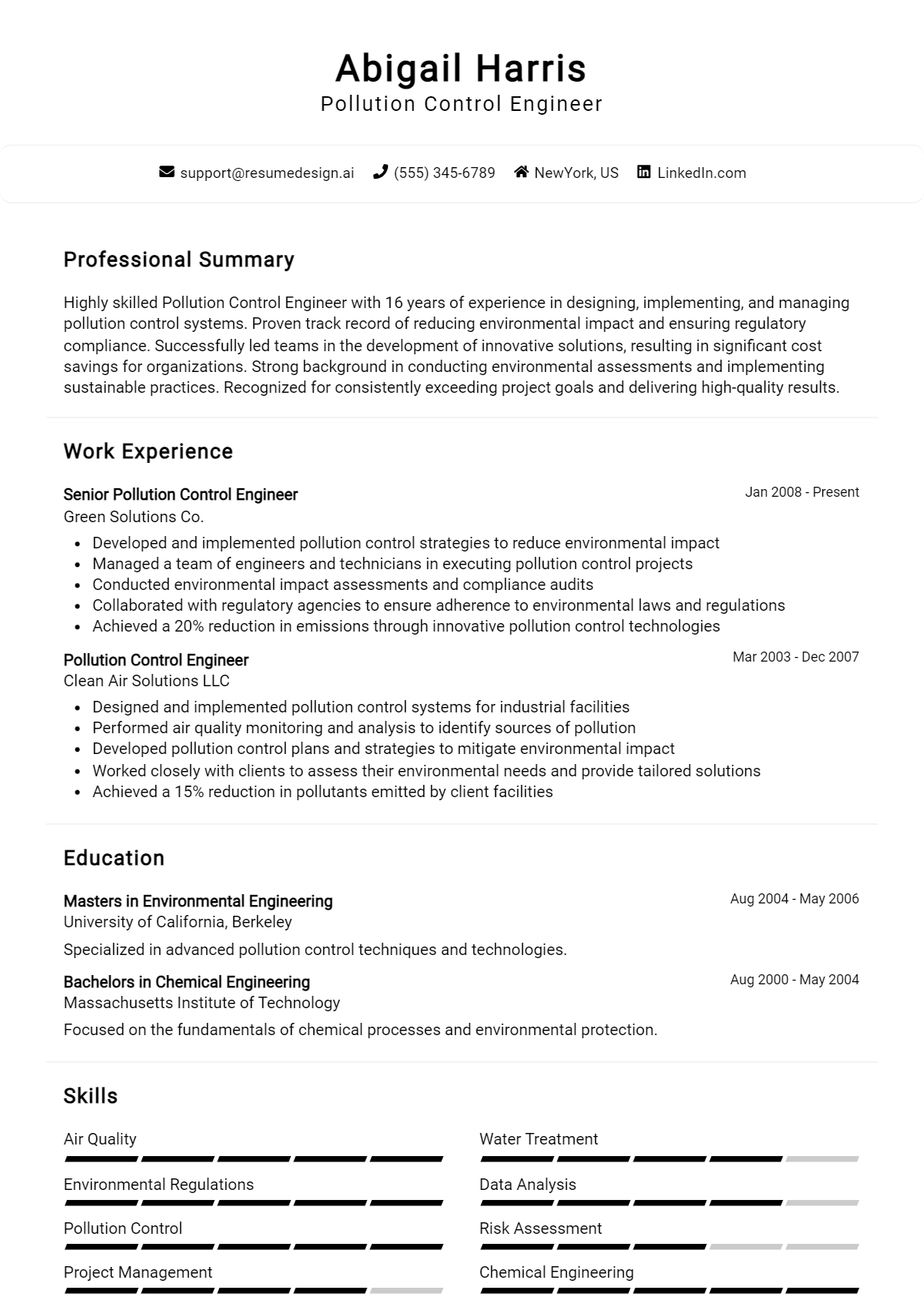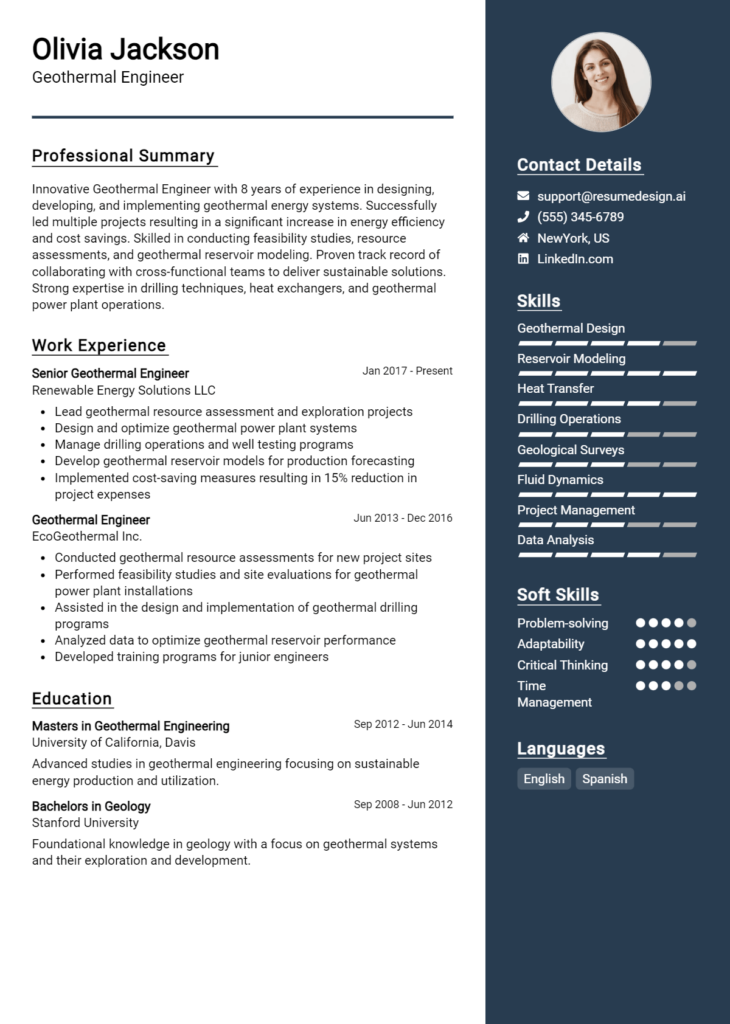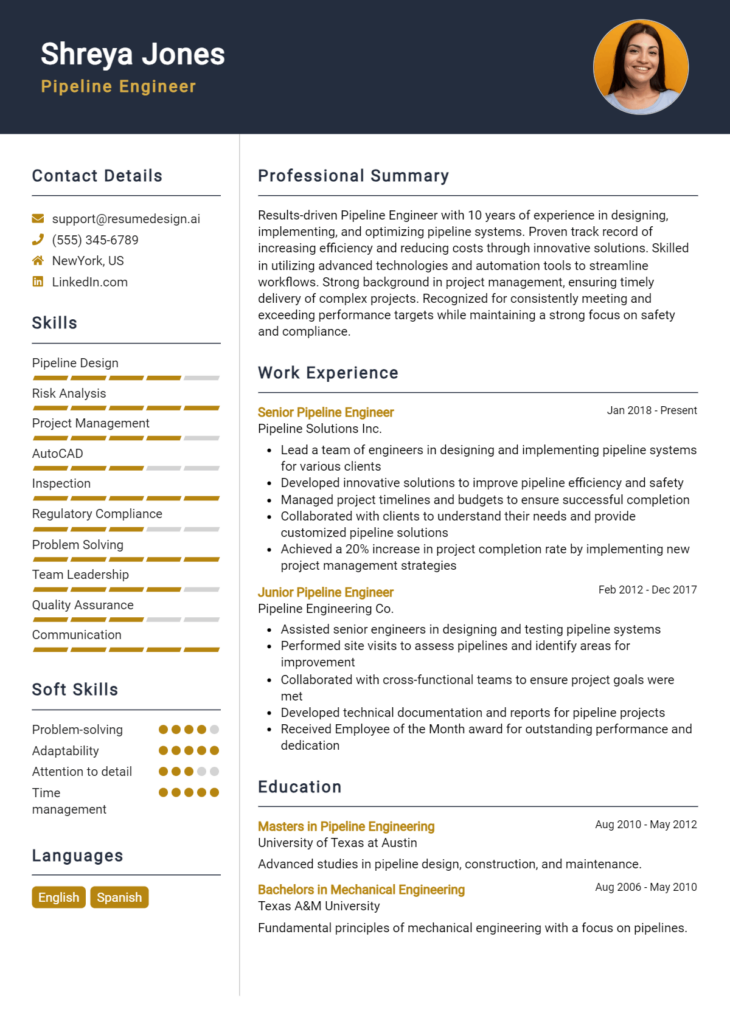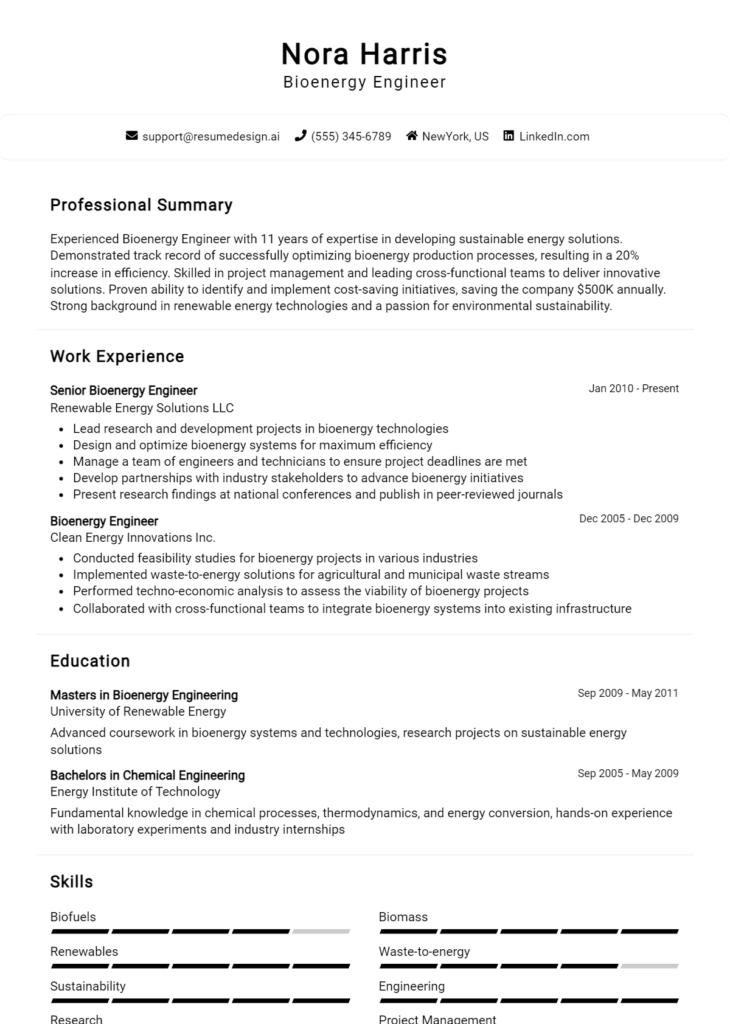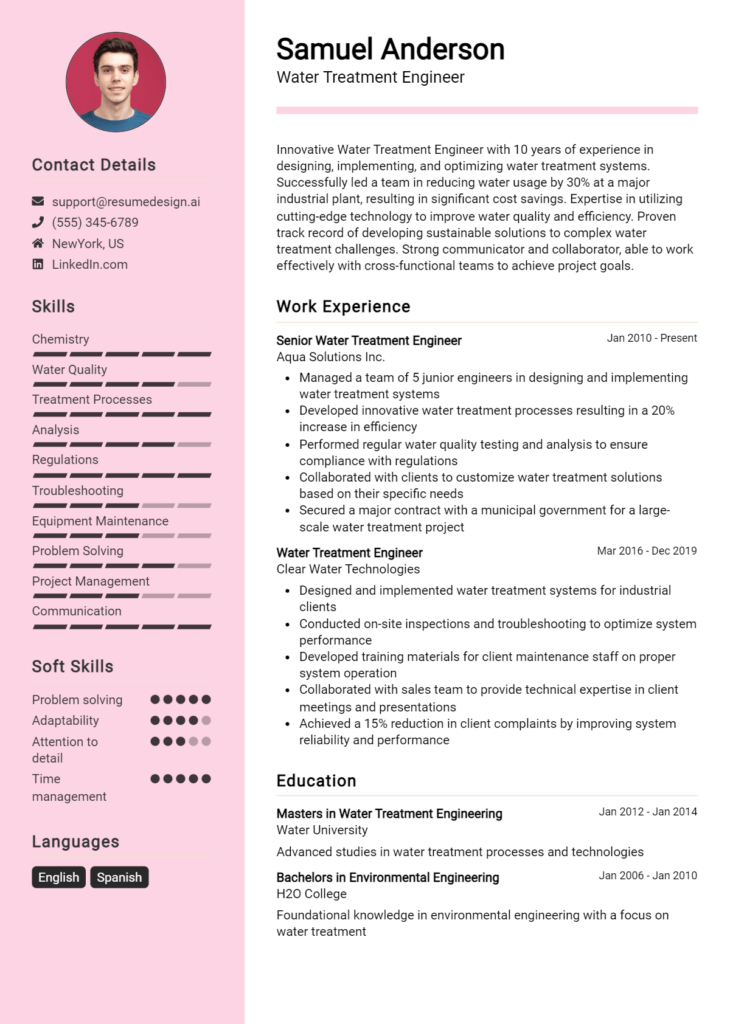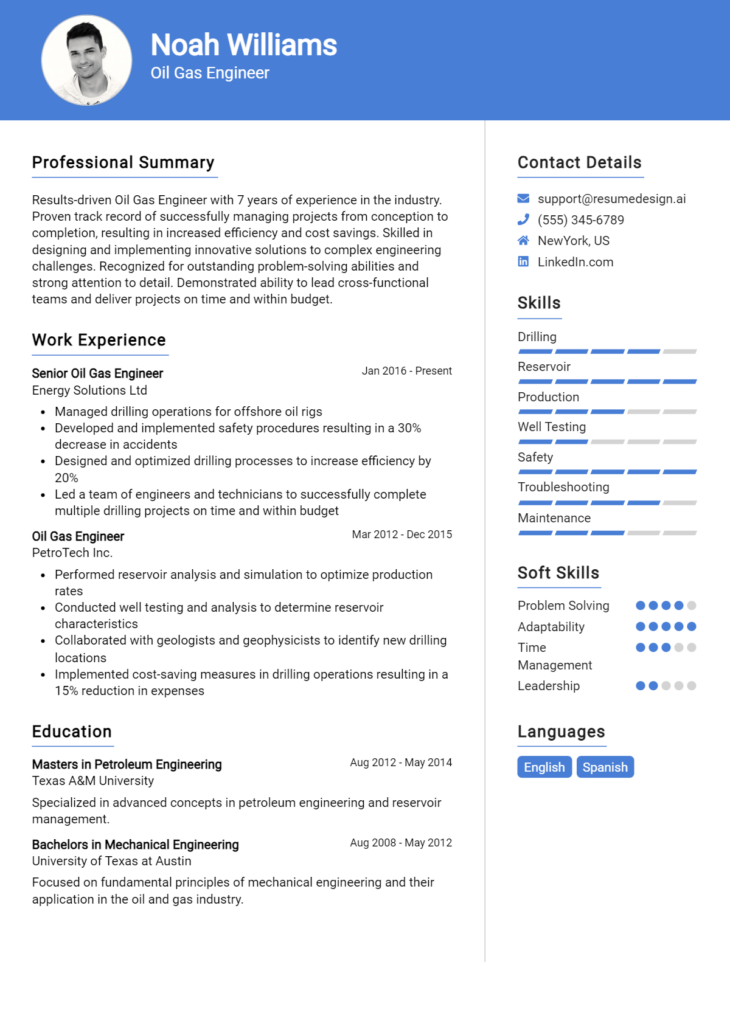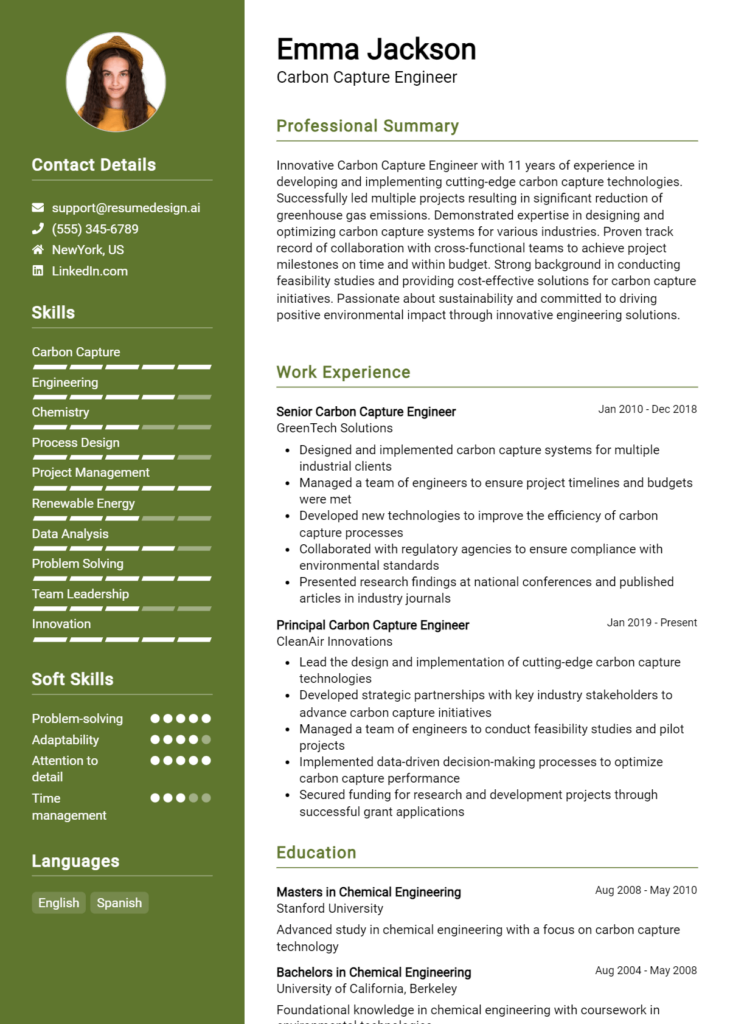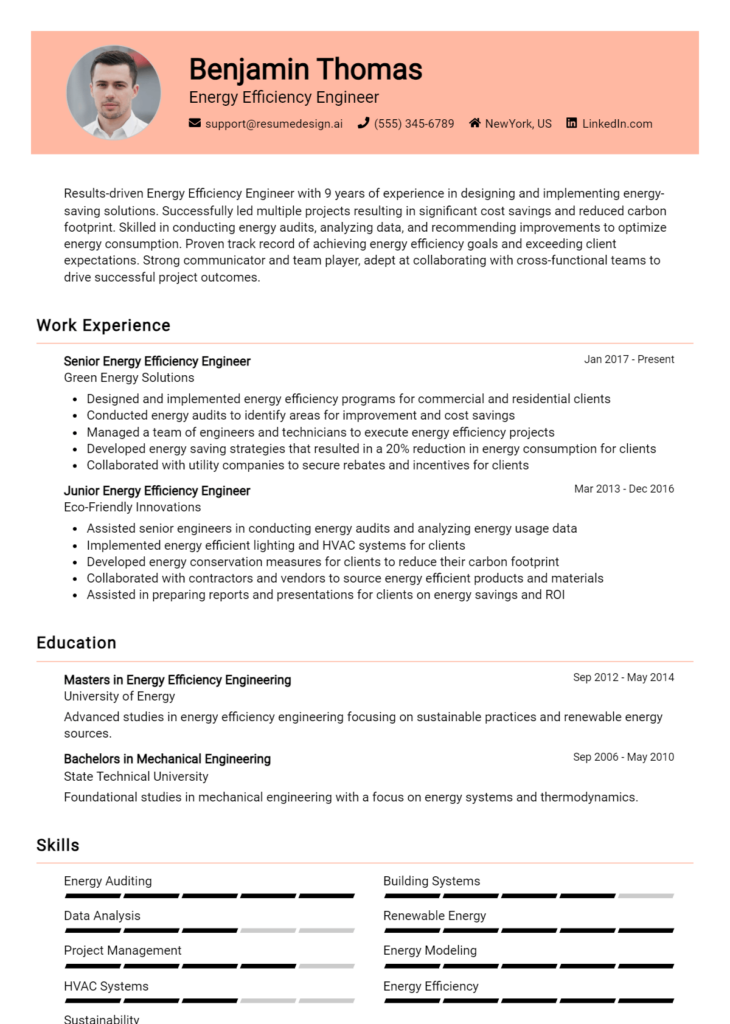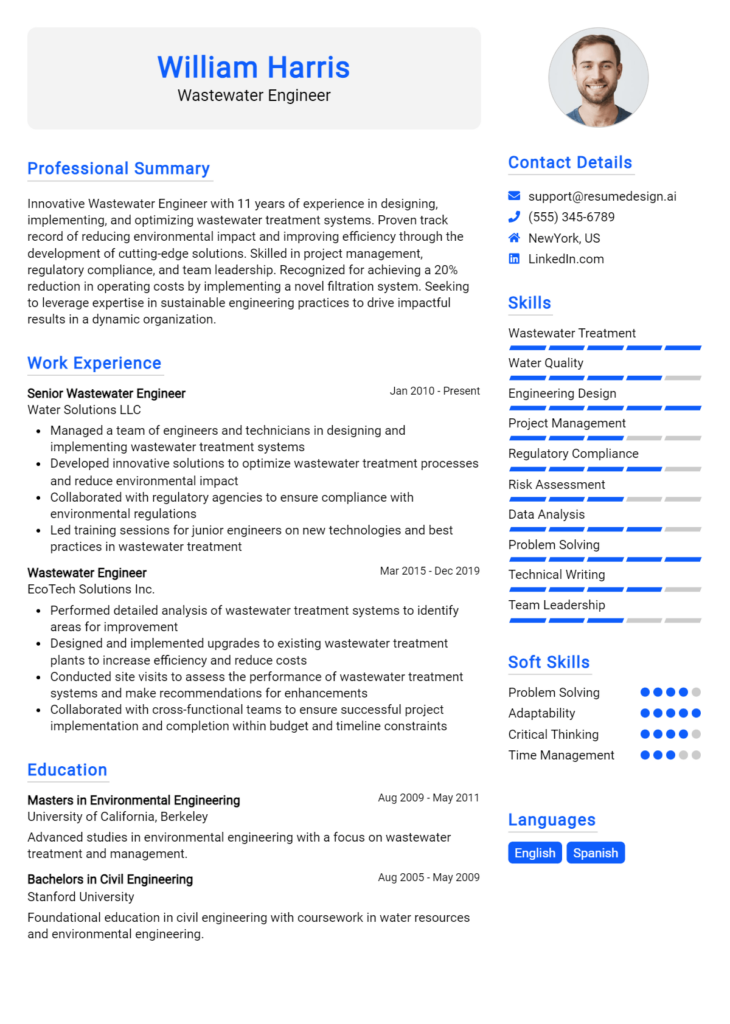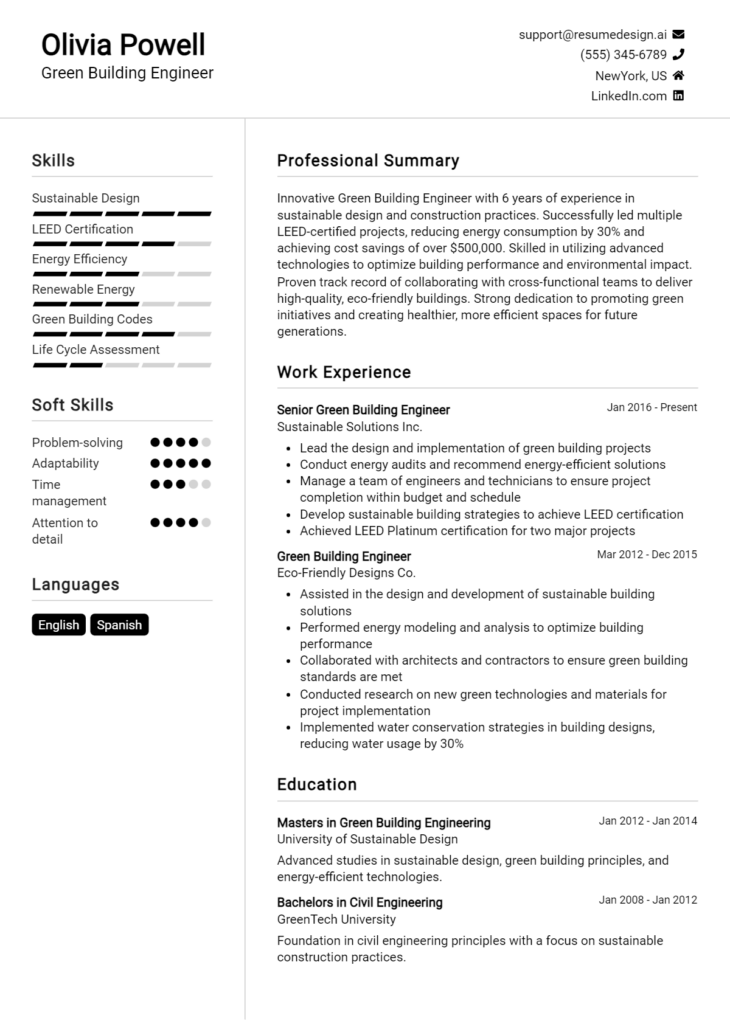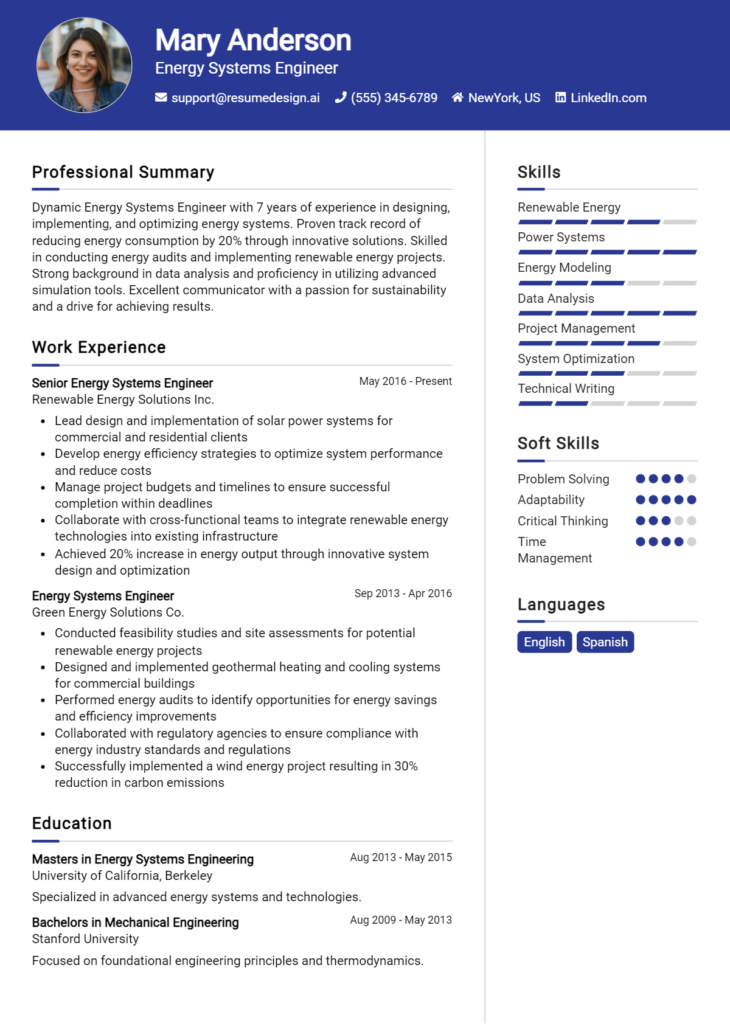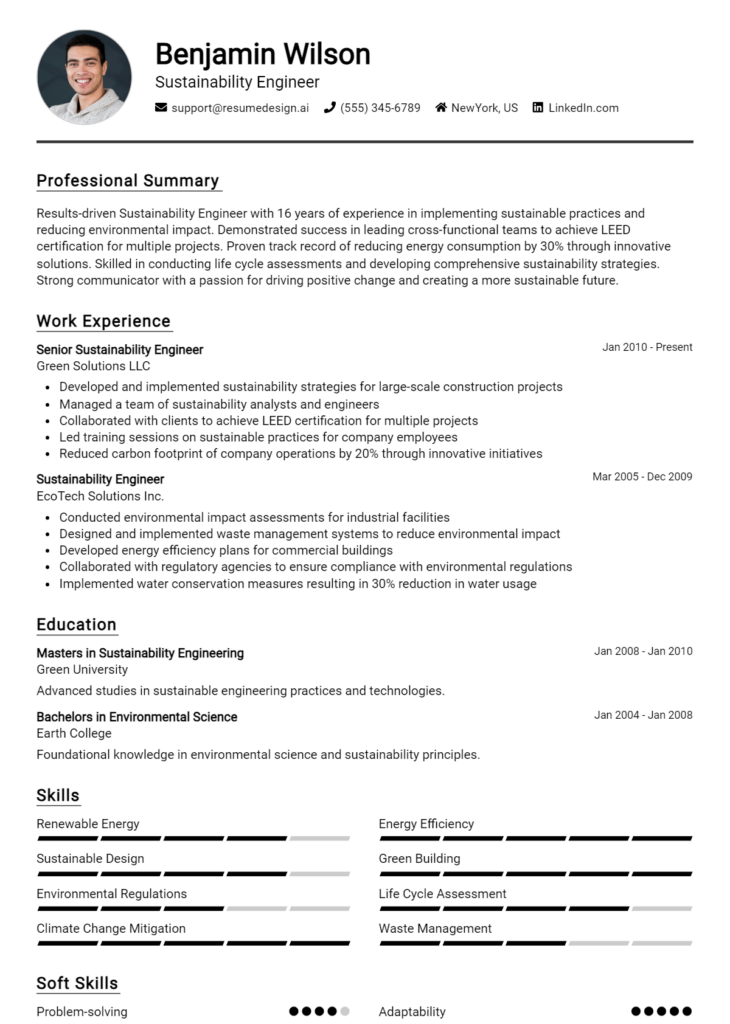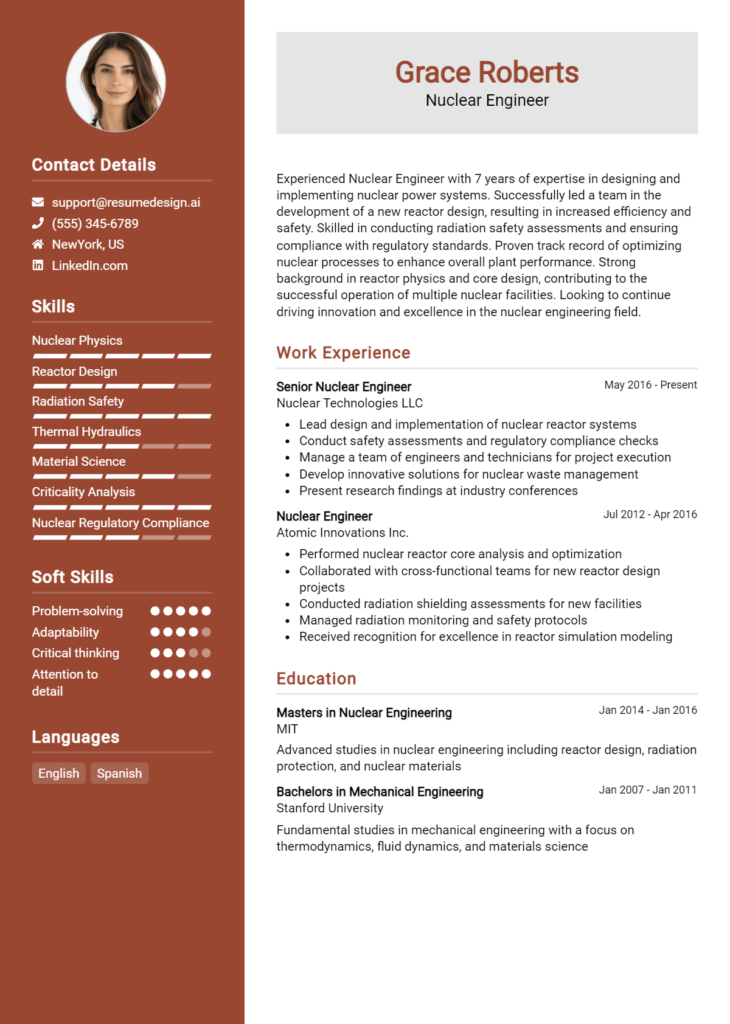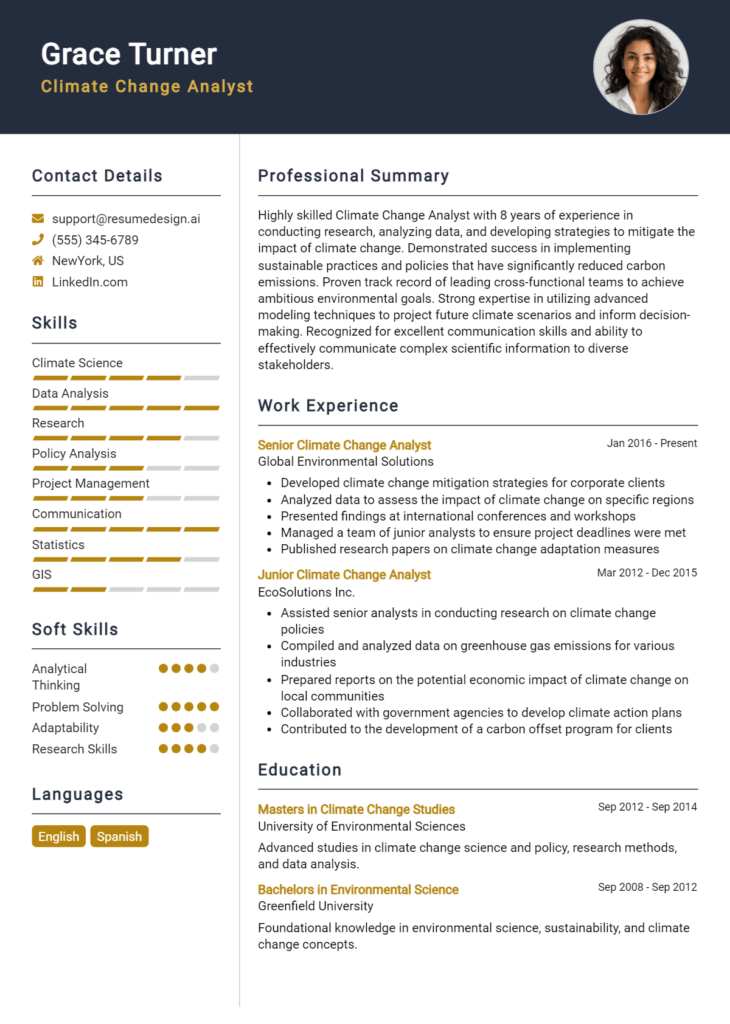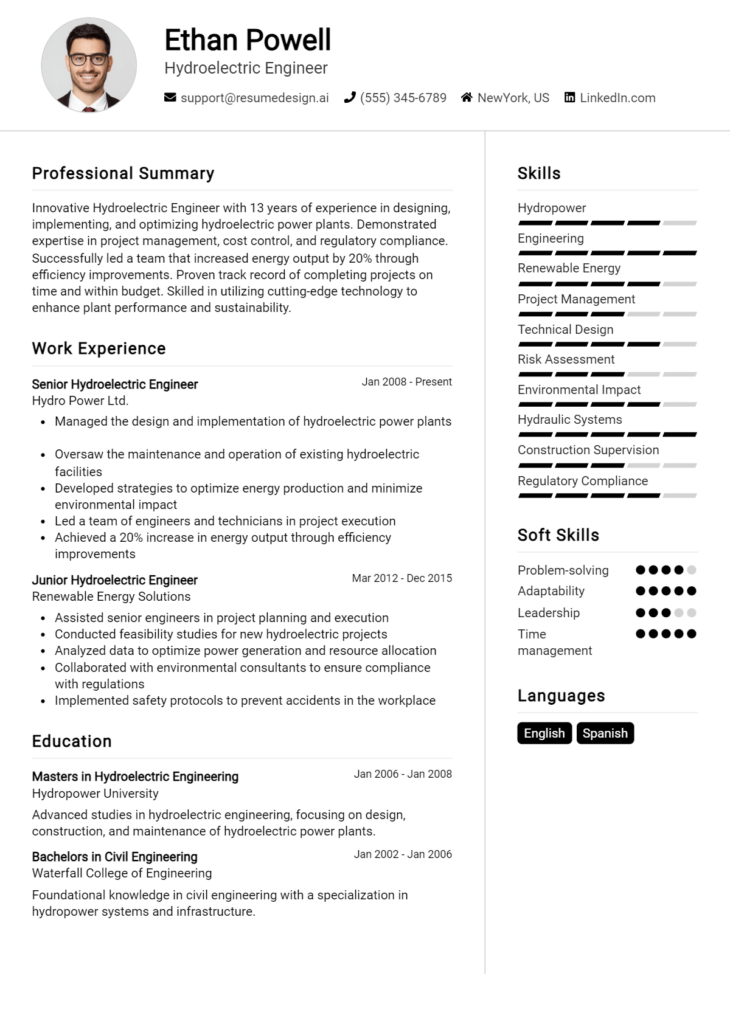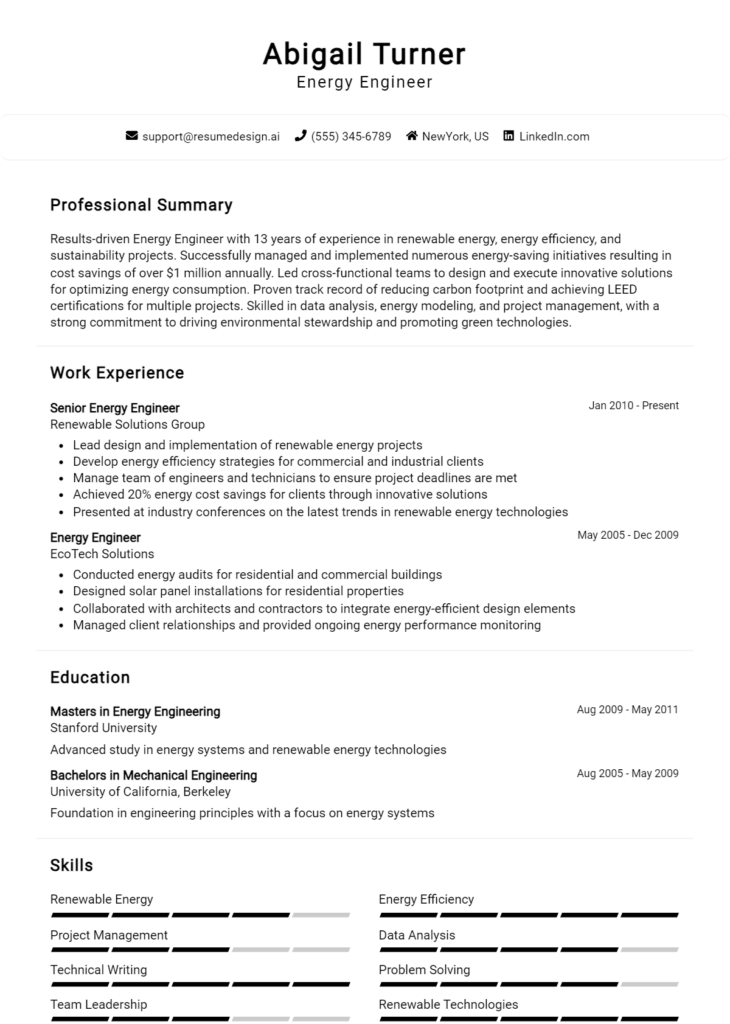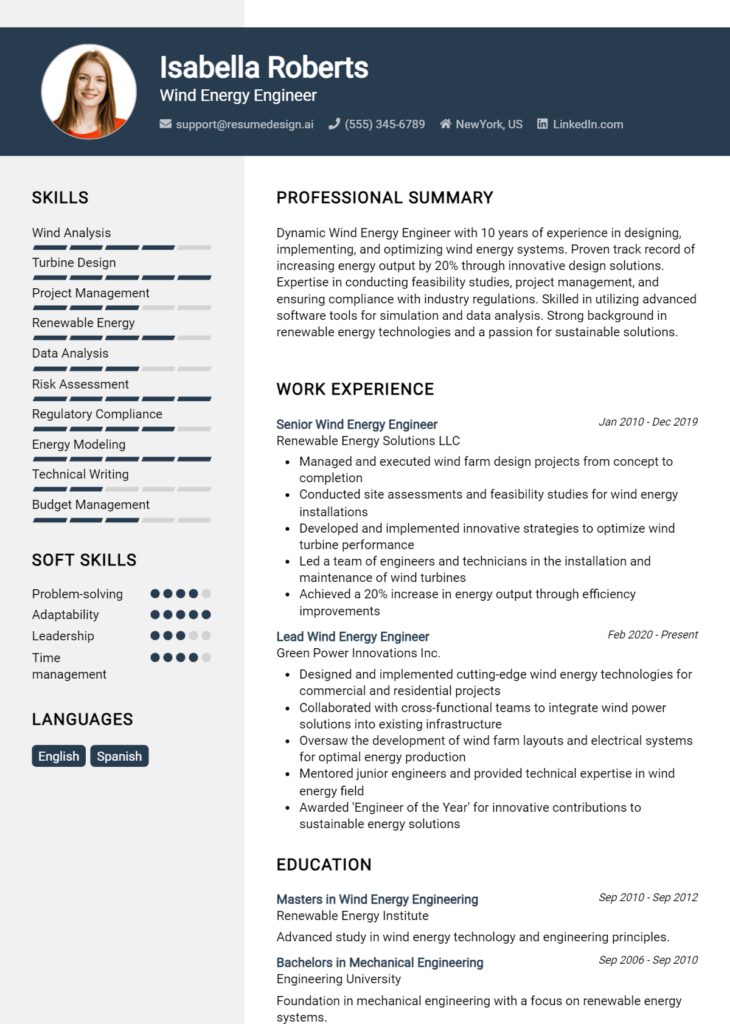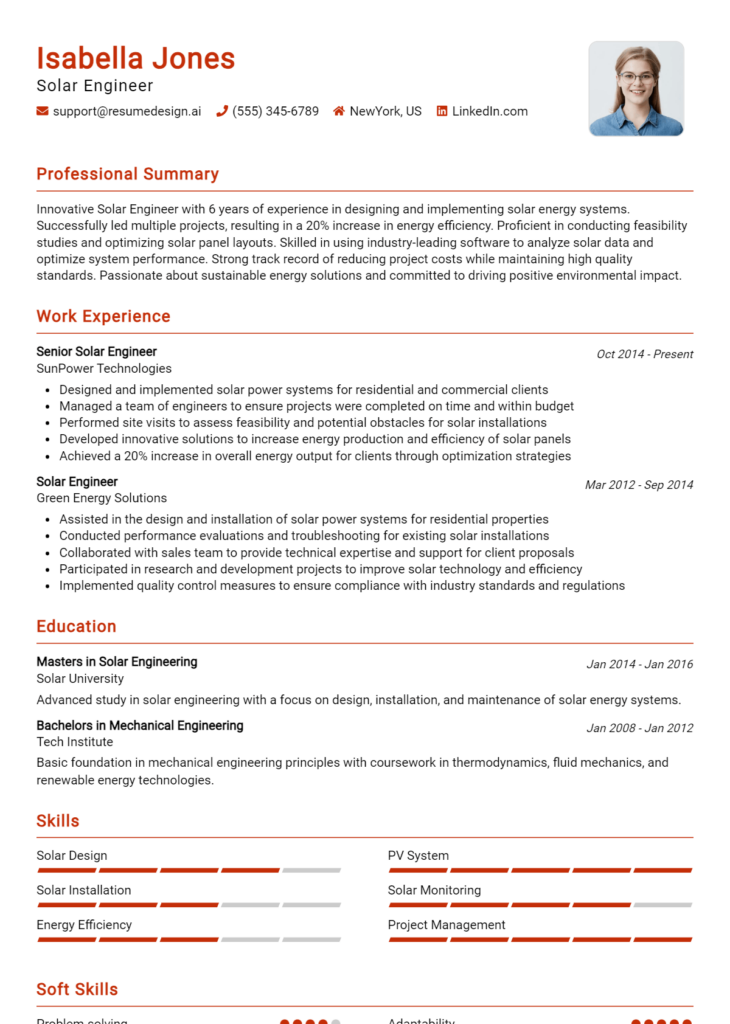Pollution Control Engineer Core Responsibilities
A Pollution Control Engineer is pivotal in managing and mitigating environmental impacts, requiring a blend of technical, operational, and problem-solving skills. This role bridges various departments, such as environmental science, engineering, and regulatory compliance, to develop and implement pollution control strategies. Strong analytical abilities and knowledge of environmental regulations are essential for success, contributing to the organization's sustainability goals. A well-structured resume can effectively highlight these qualifications, showcasing the candidate's potential to drive positive change.
Common Responsibilities Listed on Pollution Control Engineer Resume
- Conduct environmental assessments and impact studies.
- Design and implement pollution control systems and technologies.
- Monitor air, water, and soil quality to ensure compliance with regulations.
- Develop strategies for waste management and reduction.
- Collaborate with governmental agencies to ensure adherence to environmental laws.
- Prepare reports and documentation for regulatory submissions.
- Conduct training sessions on pollution control measures for staff.
- Analyze data to identify trends and recommend improvements.
- Participate in environmental audits and inspections.
- Research and stay updated on emerging pollution control technologies.
- Assist in developing contingency plans for environmental emergencies.
High-Level Resume Tips for Pollution Control Engineer Professionals
In the competitive field of pollution control engineering, a well-crafted resume is essential for making a strong first impression on potential employers. Your resume serves as a reflection of your skills, achievements, and professional ethos, often determining whether you move forward in the hiring process. It’s not just a list of job titles and responsibilities; it’s your opportunity to showcase your unique contributions to environmental sustainability. This guide will provide practical and actionable resume tips specifically tailored for Pollution Control Engineer professionals, ensuring that you effectively communicate your qualifications and stand out in a crowded job market.
Top Resume Tips for Pollution Control Engineer Professionals
- Tailor your resume to the specific job description, using keywords and phrases that match the requirements of the position.
- Begin with a strong summary statement that highlights your overall experience and passion for pollution control and environmental protection.
- Showcase relevant experience by including specific projects you worked on, emphasizing your role and the outcomes achieved.
- Quantify your achievements where possible, such as the percentage reduction in pollutants or the number of successful environmental assessments completed.
- Highlight industry-specific skills, such as knowledge of environmental regulations, pollution prevention techniques, and data analysis software.
- Include certifications and training relevant to pollution control, such as Certified Environmental Engineer (CEE) or Hazardous Waste Operations training.
- Utilize action verbs to describe your responsibilities and contributions, making your experience more dynamic and engaging.
- Keep the format clean and professional, ensuring that it is easy to read and free of jargon that may confuse hiring managers.
- Incorporate any leadership roles or team collaborations that demonstrate your ability to work effectively in diverse environments.
By implementing these tips, you can significantly enhance your resume and increase your chances of landing a job in the pollution control engineering field. A well-structured and focused resume not only highlights your qualifications but also conveys your dedication to environmental stewardship, making you a compelling candidate for potential employers.
Why Resume Headlines & Titles are Important for Pollution Control Engineer
In the competitive field of environmental engineering, particularly for Pollution Control Engineers, having a standout resume that captures the attention of hiring managers is crucial. A well-crafted resume headline or title serves as the first impression and can make a significant impact by summarizing a candidate's key qualifications in a concise, impactful phrase. A strong headline not only grabs attention but also ensures that the most relevant skills and experiences are highlighted immediately, setting the tone for the rest of the resume. Therefore, it is essential for candidates to create headlines that are not only relevant to the job being applied for but also succinct and powerful, allowing them to stand out in a crowded applicant pool.
Best Practices for Crafting Resume Headlines for Pollution Control Engineer
- Make it concise: Keep the headline short and to the point, ideally one sentence.
- Be role-specific: Tailor the title to align with the specific position of Pollution Control Engineer.
- Highlight key qualifications: Incorporate relevant skills, certifications, or experiences that directly relate to pollution control.
- Use strong action words: Choose dynamic verbs to add energy and convey confidence.
- Incorporate industry keywords: Use terminology that resonates within the environmental engineering field.
- Avoid clichés: Steer clear of overused phrases that do not add value.
- Reflect your unique value proposition: Clearly communicate what sets you apart from other candidates.
- Revise and refine: Don’t hesitate to tweak your headline until it perfectly encapsulates your strengths.
Example Resume Headlines for Pollution Control Engineer
Strong Resume Headlines
"Certified Pollution Control Engineer with 7+ Years of Experience in Waste Management Solutions"
“Innovative Environmental Engineer Specializing in Air Quality Management and Compliance Strategies”
“Results-Driven Pollution Control Specialist with Proven Track Record in Reducing Industrial Emissions”
“Experienced Water Resource Engineer Focused on Sustainable Pollution Prevention Practices”
Weak Resume Headlines
“Engineer Looking for Job”
“Environmental Specialist”
Strong resume headlines are effective because they convey essential information about the candidate’s unique qualifications, experience, and focus in a compelling manner. They immediately inform hiring managers about the candidate's expertise and relevance to the position. In contrast, weak headlines tend to be vague or generic, failing to provide any specific insights into the candidate's capabilities or suitability for the role. This lack of clarity and impact can lead to candidates being overlooked, as hiring managers are unable to gauge their fit for the position at a glance.
Writing an Exceptional Pollution Control Engineer Resume Summary
A well-crafted resume summary is crucial for a Pollution Control Engineer, as it serves as the first impression for hiring managers. This brief yet impactful statement quickly highlights the candidate's key skills, relevant experience, and notable accomplishments that align with the job role. A strong summary not only captures attention but also provides a snapshot of the candidate's qualifications, making it easier for employers to identify top talent. Therefore, it is essential for the summary to be concise, compelling, and tailored specifically to the position being applied for, ensuring it resonates with the needs of the organization.
Best Practices for Writing a Pollution Control Engineer Resume Summary
- Quantify achievements where possible, such as reductions in emissions or improvements in waste management processes.
- Focus on relevant skills that are directly applicable to pollution control, such as environmental regulations, data analysis, and remediation techniques.
- Tailor the summary to the specific job description, using keywords that align with the employer's requirements.
- Keep it concise, ideally between 3 to 5 sentences, to ensure clarity and impact.
- Highlight any certifications or specialized training in environmental science or engineering.
- Showcase problem-solving abilities and innovative approaches to pollution control projects.
- Use action verbs to convey a sense of proactivity and effectiveness.
- Maintain a professional tone while also expressing passion for environmental protection and sustainability.
Example Pollution Control Engineer Resume Summaries
Strong Resume Summaries
Results-driven Pollution Control Engineer with over 7 years of experience in developing and implementing waste management strategies, achieving a 30% reduction in hazardous waste disposal costs for a major manufacturing client. Proficient in environmental regulations and compliance, with a strong background in air quality monitoring and remediation technologies.
Dedicated environmental professional with a proven track record in pollution prevention and control, successfully leading projects that reduced carbon emissions by 25% within one year. Expertise in data analysis and environmental impact assessments, complemented by a Master's degree in Environmental Engineering.
Experienced Pollution Control Engineer with a solid background in designing effective pollution control systems. Spearheaded a project that improved wastewater treatment efficiency by 40%, resulting in significant cost savings and compliance with regulatory standards.
Weak Resume Summaries
Environmental engineer with experience in pollution control and various projects. I have worked with different teams and have some skills in environmental regulations.
Motivated individual seeking a job as a Pollution Control Engineer. I am passionate about protecting the environment and have worked on many projects in the past.
The strong resume summaries are effective because they provide specific achievements, quantify results, and highlight relevant skills that directly relate to the Pollution Control Engineer role. In contrast, the weak summaries lack detail, fail to present measurable outcomes, and come across as generic, making it difficult for hiring managers to ascertain the candidate's qualifications or potential contributions to the organization.
Work Experience Section for Pollution Control Engineer Resume
The work experience section of a Pollution Control Engineer resume is critical as it serves as a platform to showcase a candidate's technical skills, leadership capabilities, and commitment to delivering high-quality results in environmental management. This section not only highlights the professional journey and accomplishments of the candidate but also demonstrates their ability to effectively manage teams and projects within the industry. Quantifying achievements—such as reductions in pollution levels or successful completion of projects within budget—while aligning experiences with industry standards is essential to make a compelling case for the candidate’s expertise and value.
Best Practices for Pollution Control Engineer Work Experience
- Highlight relevant technical skills, such as knowledge of air and water quality regulations, pollution control technologies, and environmental impact assessments.
- Quantify achievements with specific metrics, such as percentage reductions in emissions or successful project completions within designated timelines.
- Emphasize experience in leading cross-functional teams and managing diverse stakeholders in environmental projects.
- Showcase collaborative efforts with governmental agencies, NGOs, and other organizations to promote sustainability initiatives.
- Detail responsibilities that demonstrate problem-solving abilities related to pollution control and environmental compliance.
- Use action verbs to convey a sense of proactivity and leadership in previous roles.
- Tailor experiences to align with the job description and industry standards, showcasing relevant projects and outcomes.
- Include certifications or specialized training that enhance technical expertise and credibility in the field.
Example Work Experiences for Pollution Control Engineer
Strong Experiences
- Led a cross-departmental team to implement a new waste management strategy that reduced landfill contributions by 30% over two years.
- Conducted comprehensive environmental impact assessments for three major projects, resulting in a 25% reduction in potential pollutants and receiving state recognition for compliance excellence.
- Managed a $1.5 million budget for pollution control initiatives, successfully completing all projects under budget and ahead of schedule, while achieving a 40% reduction in hazardous waste generation.
- Collaborated with local government agencies to develop and execute a community outreach program that educated over 500 residents on pollution reduction practices.
Weak Experiences
- Worked on various projects related to pollution control.
- Assisted in some environmental assessments.
- Participated in meetings about waste management.
- Helped improve processes in the department.
The examples listed as strong experiences are considered effective because they provide specific, quantifiable outcomes that demonstrate the candidate's technical leadership and collaborative efforts in pollution control. In contrast, the weak experiences lack detail and measurable results, making them less impactful in showcasing the candidate’s qualifications. Strong experiences present clear achievements and responsibilities, while weak experiences remain vague and do not convey the candidate's full potential or contributions to the field.
Education and Certifications Section for Pollution Control Engineer Resume
The education and certifications section of a Pollution Control Engineer resume plays a crucial role in establishing the candidate's qualifications and expertise in the field. This section not only highlights the academic background, including relevant degrees and specialized training, but also showcases industry-relevant certifications that demonstrate a commitment to professional development. By providing details on relevant coursework and certifications, candidates can greatly enhance their credibility and align themselves with the specific requirements of the job role, showcasing their dedication to continuous learning and adherence to industry standards.
Best Practices for Pollution Control Engineer Education and Certifications
- Include relevant degrees such as Environmental Engineering, Civil Engineering, or Chemical Engineering.
- List industry-recognized certifications, such as the Certified Environmental Professional (CEP) or Certified Hazardous Materials Manager (CHMM).
- Highlight any specialized training or workshops related to pollution control technologies or regulations.
- Provide details on coursework that directly pertains to pollution control, environmental science, or waste management.
- Be specific about the level of education and year of graduation to showcase your timeline of learning.
- Showcase any ongoing education, such as online courses or certifications to demonstrate a commitment to staying current in the field.
- Use clear and concise language to ensure easy readability and understanding of qualifications.
- Consider adding honors or awards received during your academic career that relate to environmental studies.
Example Education and Certifications for Pollution Control Engineer
Strong Examples
- Bachelor of Science in Environmental Engineering, University of XYZ, 2020
- Certified Environmental Professional (CEP), 2021
- Advanced Wastewater Treatment Technologies Course, 2022
- Master's Degree in Civil Engineering with a focus on Water Resources, University of ABC, 2023
Weak Examples
- Bachelor of Arts in History, University of DEF, 2015
- Certification in Basic First Aid, 2020
- Online Course on General Project Management, 2021
- High School Diploma, 2010
The strong examples are considered effective because they directly relate to the field of pollution control engineering, showcasing relevant degrees and certifications that demonstrate expertise in environmental issues. In contrast, the weak examples lack relevance to the job role, featuring qualifications that do not contribute to the candidate's ability to perform as a Pollution Control Engineer. This distinction underscores the importance of aligning educational and certification backgrounds with industry-specific requirements to enhance a resume's impact.
Top Skills & Keywords for Pollution Control Engineer Resume
As a Pollution Control Engineer, possessing the right skills is crucial for effectively addressing environmental challenges and implementing sustainable practices. A well-crafted resume that highlights both hard and soft skills can significantly enhance your chances of securing a position in this competitive field. Employers seek candidates who not only have technical expertise but also demonstrate strong interpersonal abilities and problem-solving skills. By showcasing your qualifications through relevant skills and solid work experience, you can present yourself as a well-rounded professional ready to tackle pollution control issues.
Top Hard & Soft Skills for Pollution Control Engineer
Soft Skills
- Analytical Thinking
- Communication Skills
- Team Collaboration
- Problem-Solving Abilities
- Attention to Detail
- Time Management
- Adaptability
- Critical Thinking
- Project Management
- Interpersonal Skills
Hard Skills
- Environmental Impact Assessment
- Knowledge of Pollution Control Technologies
- Data Analysis and Interpretation
- Regulatory Compliance
- Air and Water Quality Monitoring
- GIS and Environmental Modeling
- Waste Management Techniques
- Technical Report Writing
- Fieldwork and Site Assessment
- Proficiency in Environmental Software (e.g., AutoCAD, MATLAB)
Stand Out with a Winning Pollution Control Engineer Cover Letter
I am writing to express my interest in the Pollution Control Engineer position at [Company Name] as advertised on [Job Board/Company Website]. With a solid background in environmental engineering and a proven track record in pollution control strategies, I am excited about the opportunity to contribute to your team. My hands-on experience in designing and implementing pollution control systems, paired with my commitment to sustainable practices, aligns well with your organization’s mission to foster a cleaner and healthier environment.
In my previous role at [Previous Company Name], I successfully led a project focused on reducing industrial emissions, which resulted in a 30% decrease in pollutants released into the atmosphere. I utilized advanced modeling techniques to assess the impact of various control measures and collaborated with multidisciplinary teams to implement state-of-the-art filtration and scrubbing technologies. My ability to analyze data and draw actionable insights has been instrumental in driving compliance with environmental regulations and improving overall operational efficiency.
I am particularly drawn to [Company Name] due to your innovative approach to pollution management and your commitment to community engagement in environmental stewardship. I am eager to bring my expertise in regulatory compliance, environmental impact assessments, and stakeholder communication to your esteemed organization. I believe that my proactive approach to problem-solving and my passion for sustainable development will enable me to make a positive impact on your projects and initiatives.
Thank you for considering my application. I look forward to the opportunity to discuss how my skills and experiences align with the needs of your team. I am excited about the possibility of working together to create effective solutions that address pollution challenges and contribute to a more sustainable future.
Common Mistakes to Avoid in a Pollution Control Engineer Resume
When crafting a resume for a Pollution Control Engineer position, it is crucial to present your qualifications and experiences in a clear and compelling manner. However, many candidates make common mistakes that can undermine their chances of landing an interview. Understanding these pitfalls can help you create a more effective resume that stands out in a competitive job market. Here are some frequent errors to avoid:
Generic Objective Statements: Using a one-size-fits-all objective statement fails to showcase your specific interest in the pollution control field and the organization you are applying to. Tailor your statement to reflect your career goals and how they align with the company’s mission.
Lack of Relevant Keywords: Many employers use applicant tracking systems (ATS) to filter resumes. Neglecting to include industry-specific keywords related to pollution control can result in your resume being overlooked. Research job descriptions to identify essential terms you should incorporate.
Overloading with Technical Jargon: While technical skills are vital in this field, using excessive jargon can alienate hiring managers who may not have a technical background. Strive for a balance by explaining complex terms clearly while still demonstrating your expertise.
Omitting Quantifiable Achievements: Failing to highlight specific accomplishments can weaken your resume. Use numbers and statistics to illustrate your impact, such as “reduced emissions by 30% through the implementation of a new waste management protocol.”
Poor Formatting: A cluttered or unprofessional layout can detract from the content of your resume. Ensure your formatting is clean, consistent, and easy to read, using bullet points and headings to guide the reader through your qualifications.
Ignoring Soft Skills: While technical abilities are essential, soft skills such as communication, teamwork, and problem-solving are equally important. Don’t forget to include examples that demonstrate your interpersonal skills and your ability to work collaboratively.
Neglecting Continuing Education: The field of pollution control is constantly evolving. Failing to mention any relevant certifications, workshops, or training can make your resume seem outdated. Highlight any ongoing education or professional development to show your commitment to staying current in the industry.
Submitting Without Proofreading: Typos and grammatical errors can create an impression of carelessness. Always proofread your resume multiple times and consider asking a peer for feedback to ensure it is polished and professional.
Conclusion
As a Pollution Control Engineer, your role is vital in safeguarding the environment by designing, implementing, and managing systems that reduce pollution and promote sustainable practices. Throughout this article, we explored the key responsibilities of a Pollution Control Engineer, which include conducting environmental assessments, developing pollution control strategies, and ensuring compliance with environmental regulations. We also discussed the importance of staying updated with technological advancements and regulatory changes to effectively address emerging environmental challenges.
In conclusion, to stand out in this competitive field, it's essential to have a well-crafted resume that highlights your skills, experience, and achievements. We encourage you to take the time to review and update your Pollution Control Engineer resume to better reflect your qualifications and career aspirations.
To assist you in this process, we recommend utilizing helpful resources such as resume templates, which can provide a professional layout, and the resume builder, which simplifies the creation of your resume with user-friendly tools. Additionally, you can explore resume examples for inspiration and ideas on how to showcase your expertise effectively. Don't forget to complement your resume with a strong cover letter, utilizing our cover letter templates to make a great first impression.
Take action today by reviewing and enhancing your resume, ensuring it captures your strengths and aligns with your career goals.

